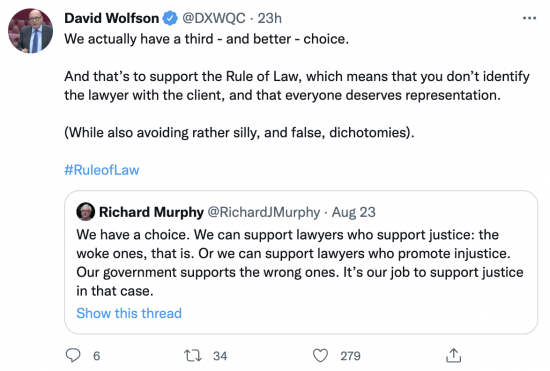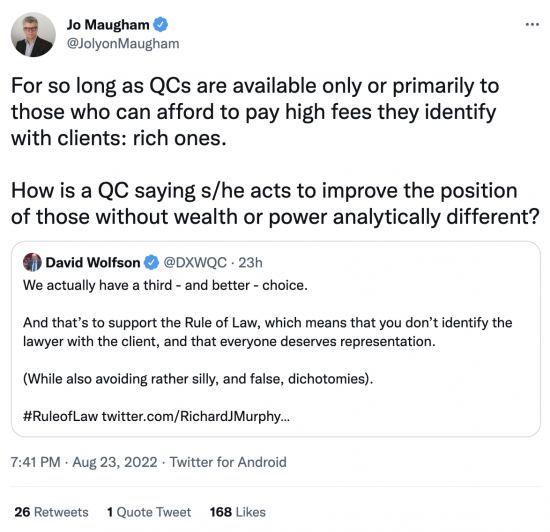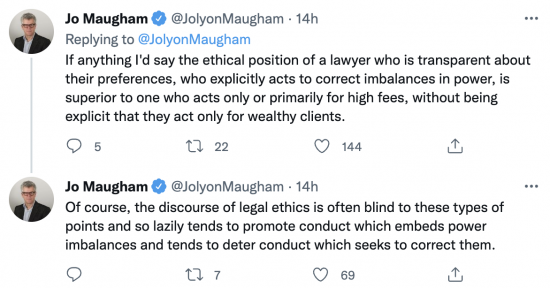I posted this thread this morning:
I note that David Wolfson QC, who is also Tory peer Baron Wolfson of Tredegar, and who was until fairly recently a Tory justice minister, has responded to my thread on the threat from right wing layers, published yesterday. Some thoughts….
First, this is David Wolfson's comment:

I also note Jo Maugham from the Good Law Project has already replied, saying:


I have a lot of sympathy with what Jo has to say. However, so naive is David Wolfson's comment, and so misleading is it that I think it worthy of a response.
What Lord Wolfson wants us to do is imagine there is a concept called ‘the rule of law', which he says exists. It is upheld, he says, by lawyers acting on behalf of clients from whom they are independent, providing those lawyers with an objective status that is beyond criticism.
I trust David Wolfson will forgive me for saying so, and I make clear that I comment on this within the political sphere, but this claim is risible. Let me offer an analogy as a way into offering explanation.
This claim is as naive as that of the economist who suggests there are ‘free markets' in which independent firms compete as price takers seeking to service customers, each of whom gets the best deal possible because they have perfect knowledge and equal access to capital.
I stress, the assumptions just noted are the basis on which most microeconomic theory still claims that markets are the solutions to all problems. That economic twaddle is the whole basis of Tory political economy. And it is, of course, utter nonsense.
Why is that? Three reasons. First, firms are not independent. As Adam Smith noted, they act in collusion against the public interest. Second, modern companies are not price takers. Try haggling at the supermarket check-out if you want to prove that.
Third, there are massive asymmetries of knowledge in markets, with the odds all stacked against the consumer. Your Tesco Clubcard proves that. And fourth, as is glaringly obvious, not all consumers do have equal access to capital within the marketplace.
Why is this analogy worth offering? Simply because it exposes the incredible ability of the right-wing brain to believe that which is not credible whilst ignoring the power relationships that actually influence the real world to the advantage of those usually voting Tory.
How does it compare to what David Wolfson claimed? First, the Rule of Law is an idea that is as far removed from reality as is the free market. Both are convenient theoretical fictions whose existence is denied by the practice of powerful elites in society.
In the economy those powerful elites are in business, actively aided and abetted by politicians who see it as their job to enable those elites. Call them Tories if you like, but New Labour was also pretty good at this.
In the law those elites are the lawyers, and most especially the powerful law firms, both on and offshore, who do most definitely act with quite clear political agendas that are intensely pro-market.
Those lawyers and the clients who instruct them, and the counsel they engage, are not independent of each other, or the political economy that sustains them. Their clear common interest is to sustain that political economy and the relationships of power within it.
It is those relationships of power that the economists that I refer to ignore when undertaking their work. It is those same relationships of power that David Wolfson also appears to ignore, in my opinion. And it is these relationships of power that matter.
It is relationships of power that ensure that the Tory-aligned press attack some parts of the legal profession whilst ignoring the attacks on society that other parts of that profession enable, as I discussed in my original thread.
It is relationships of power that let lawyers create structures using offshore that undermine the rule of law and democracy in the UK.
It is relationships of power that decided that most people are denied access to legal aid in the UK, meaning that millions are denied legal aid when they need to defend themselves from criminal charges and when conducting vital civil litigation e.g. on divorces.
And it is relationships of power that have denied funding to courts so that they might clear backlogs of cases, and to lawyers so that they can afford to represent clients run those cases.
Let's not pretend that these relationships of power that have skewed access to legal remedies towards a very few in society do not exist, because they very obviously do.
And let's also not pretend that any of this was by chance: much of it was done under governments led by the Tories, who ennobled David Wilson and who he was happy to serve as a minister.
Now, if in this tweet David Wolfson is saying he misused his time in office, and was mistaken in his belief that the Tories were interested in the rule of law, then I will of course withdraw my criticism.
And if what he is actually arguing for is that anyone with a need for representation will get at a fair cost, I am delighted. But I am not convinced that is what he is saying, although he might correct me.
Instead he seems to be saying there is a rule of law where objective lawyers act independently of the economic status of their clients.
That, I think is nonsense intended to distract discussion from the very real issues that we face when trying to deliver justice for all in the UK, which can only happen when the relationships of power preventing that from happening are properly understood.
Thanks for reading this post.
You can share this post on social media of your choice by clicking these icons:
You can subscribe to this blog's daily email here.
And if you would like to support this blog you can, here:



I first wrote this comment on your earlier thread – and now it would seem even more apt here. (For better clarity, I have corrected a “cannot” to a “can” in the copy pasted below.)
We tend to discuss these matters as if the entire legal system – in either/both England and Scotland was not fundamentally flawed in the first place. But it is/they are.
Just what part of clause 40 of Magna Carta is met by systems which are not equally available to any and all citizens on grounds of cost? And worse, which can be manipulated by the deliberate stressing of citizens to the point of surrender of their rights to justice, by the piling on of costs/threat of financial penalties. Let’s quote it.
“To no one will we sell, to no one will we deny, or delay right or justice.” The ‘selling’ of justice is excactly what both systems are guilty of supporting – and will go on doing so until a NLS – a National Legal Service – replaces the private, and therefore wealth manipulated, legal system.
(Having said that – of course the present strikes are a necessary reaction to the Tory party’s attempts in government to make a grossly unfair system even more unfair and inequitable. But it really is only fighting to find a plug – while storm waves are crashing over the side! )
The problems start long before anyone gets to the point of requiring legal representation. For most public sector workers, any significant financial malfeasance, would result in criminal charges being filed. If you are a privileged, well connected, and wealthy MP, you can defraud the public purse with impunity, safe in the knowledge that your collar will never be ruffled by the long arm of the law.
An expert deconstruction of one of Neo-liberalism’s biggest lies – the supposed rational objectivity of the market.
According to James Buchanan’s Public Choice Theory, only the public sector and the state engage in subjectively self-serving behaviours and motives.
Having worked in both public and private organisations they BOTH do it (as they both can do superb things too) and it is worth noting that the self-serving elements are most lucrative in the private sector – certainly not the public.
QCs are telling me I am wrong on Twitter
Just like tax havens once told me I was
Well, they will do won’t they?
And how many QCs are just hired guns?
All of them.
It just depends on who is doing the hiring. Apparently its the fee that helps the poor QC cope with defending the indefensible – salves their conscience.
A bottle of Bollinger or two does wonders for one’s scruples.
If like the vast majority of the population you don’t have the means to retain private legal counsel, your defence against what might be serious criminal charges, is going to be a barrister who is massively overworked, and disgracefully underpaid. How can the concept of a fair trial exist, when the state can stack the deck in its favour by making sure that for most people, their defence will fall very far from proving them their best chance of acquittal?
The concept of the “Rule of Law” plainly exists, as intangible concepts, just as the concept of the divine, or equality, or the colour blue, all exist. We can describe and define each of them.
Perhaps Tom Bingham’s eight points from 2010 is the best recent attempt to set it down what “Rule of Law” means. Here is a summary from a speech by Dominic Grieve QC MP when Attorney General in Moscow (!) in 2013:
1. The law must be accessible, intelligible, clear and predictable.
2. Questions of legal right and liability should ordinarily be resolved by the exercise of the law and not the exercise of discretion.
3. Laws should apply equally to all.
4. Ministers and public officials must exercise the powers conferred in good faith, fairly, for the purposes for which they were conferred – reasonably and without exceeding the limits of such powers.
5. The law must afford adequate protection of fundamental Human Rights.
6. The state must provide a way of resolving disputes which the parties cannot themselves resolve.
7. The adjudicative procedures provided by the state should be fair.
8. The rule of law requires compliance by the state with its obligations in international as well as national laws.
The question is whether and to what extent the legal and political system in the UK delivers “Rule of Law”, and the direction of travel. It is more of a spectrum, with some areas better than others, not really a binary “yes” or “no”- I’d argue that, on the whole, the Rule of Law still applies in the UK, but the direction of travel not good.
For example, with internet resources (BAILII, legislation.gov.uk) the law may be more accessible today than it ever has been. But it is often not clear and intelligible. There are independent courts, and in principle they can resolve disputes in a fair manner and protect fundamental rights, but they do not have adequate funding, and the current government seems determined to be free from all constraints, legal or otherwise. The “will of the people” is a slippery concept. But the UK is probably better in most regards than, say, Russia, or China.
So, I’d ask Richard: what conditions would need to prevail in the UK for you so agree that we do in fact have “Rule of Law” here?
Comprehensive legal aid for most common issues
Well funded courts
Speedy justice
An unbiased police force
Lawyers properly disciplined for unethical conduct
Good shot, Richard. I think that list would do pretty well to answer a very reasonable challenge. And of all of them the depth and responsiveness of the first is perhaps the most crucial of all.
You know, I think if you had a real job and was in a real relationship then all of this guff you produce would be happening.
I am sorry you think being a professor / researcher is not a job
And having asked my wife, she would like to know what is unreal about our relationship?
I always thought that the rule of law was either derived from legislation passed by Parliament or based upon judicial decisions made in previous similar cases. In each case, judges need to be weighing up all the evidence and come to a rational decision. Over Paid QCs who are obviously biased towards vested interests rather than the public good should be sussed out by judges.
The rule of law should be able to stop this happening.
https://leftfootforward.org/2022/08/tories-quietly-publish-dangerous-plan-to-neuter-elections-watchdog-and-undermine-its-independence/
Worth pointing out that because the UK doesnt have a legal ‘code’ – ie all legislation in one place and dont get me started on caselaw, we dont even get to Point 1 in the list
I think this breaks all the commonsense rules that Dominic Grieve mentioned. The government has done nothing since 2012 when they were first told it was illegal.
https://eachother.us10.list-manage.com/track/click?u=0a5e63920f07da4c8a073993a&id=b00f000120&e=6b397e5e2e
Liz Truss cut the cash for the Environment Agency when she was in charge, and now she is going to be given more power.
Sadly depressing.
I note your reference in today’s today post (28thAug)_ to Oliver Bullough’s book “Butler to the World” Which paints a picture of the UK crime agency (National Crime Agency) as a largely neutered force. Starved of funding and losing, capable, experienced yet demoralised staff to work as “advisors” to the very lawyers of the rich and powerful who then evade all sorts of investigations into malpractice and tax avoidance, if not evasion. Though we will, never know as the NCA is now too scared and underfunded to risk taking on big cases.
Thoroughly appalling.
These lawyers need to take a long hard long at themselves in their gilt-edged mirrors